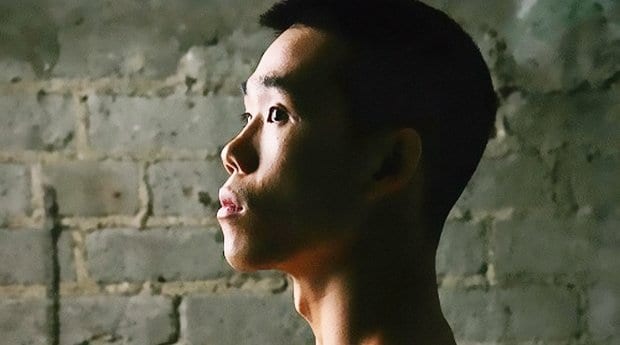
Jeff Ho, in Unknown Soldier. Credit: Alejandro Santiago
Jonathan Seinen’s play Unknown Soldier was conceived three years ago on a plane from San Francisco to Victoria. He’d been vacationing off the grid in California, and the in-flight movies were his first taste of electronic entertainment in weeks. One of the films was a documentary on Chelsea (formerly Bradley) Manning, the soldier who released hundreds of classified documents on American diplomatic and military operations, later published by WikiLeaks.
Alternately called a traitor and a hero, Manning avoided the death penalty but was sentenced to 35 years. The other side of the story, however, that of Manning’s post-arrest gender transition, was largely ignored by the media. Set in what fans of Orange Is the New Black will know as “the SHU” (a formal term for solitary confinement), the play opens with a soldier waking the morning after being sentenced, needing to formulate a public statement and wanting to come out to the world as female.
“Manning broke down the illusions that kept the activities of the war behind a veil of national security,” Seinen says. “She did the same when faced with her own inner truth. The courage to do this, when the weight of the military and society is pushing down on you, is inspiring.”
Though inspired by a documentary, Unknown Soldier is a fictionalized take on Manning’s experience rather than a direct recounting of her story.
“I can’t know all the details of her life, so I needed some theatrical fiction to connect the dots,” Seinen says. “But mainly, I wanted to write a play in which Canadian audiences would feel implicated. We went to war in Afghanistan and participated in handing over detainees who faced possible torture. Our government is moving towards more secrecy for themselves while putting their citizens under surveillance to a greater degree. Too often, we as Canadians look at these kinds of stories and think, ‘Oh, those Americans…’ But we’re facing the same challenges and they need to be addressed.”
Anthony Johnston and Nathan Schwartz did some serious research on gay conversion therapy for A Quiet Sip of Coffee (or, This Is Not the Play We’ve Written). In 2004, the Brooklyn-based theatre duo sent a prank letter to Hope Springs (a “reparative therapy” organization) proposing the group give them funds to workshop their non-existent play Never Cry Wolfman. Not expecting a response, they were shocked to get a note a few weeks later inviting them to develop their script on the condition they spend two weeks in the group’s rural British Columbia conversion camp. To make matters slightly more complex, Johnston is gay, while Schwartz identifies as straight.
“One of the first things you realize is how seductive these groups are with their messaging,” Johnston says. “As we started getting deeper into the material, it began to affect me in a way I didn’t think was possible. I found myself starting to ask if certain things from my childhood had led me to being gay and whether being depressed sometimes was actually because I’m gay.”
The easy route would have been to make a show that smacks down the increasingly discredited therapy and its proponents. But as the pair got further into their research, they were surprised by how it affected their positions.
“You can easily look at someone administering this therapy and say they’re doing it because they’re a complete bigot with their own internalized homophobia,” Schwartz says. “But that’s not necessarily the case. You have people who are trained therapists working with people who have feelings they can’t explain or don’t want to have, and that’s not necessarily coming from a place of hate. Sexuality is pretty elastic, and some people go through different phases in their life. If I go through a gay phase in high school and grow up to marry a woman, does that automatically mean I’m denying something in myself? From that perspective, we need to be open to the idea that sexuality actually does change for some people.”
“As you look into it more, things start to get very grey,” Johnston adds. “Why should helping someone become something they believe they should be inherently wrong? If someone believes they were born in the wrong-gendered body, it’s perfectly acceptable to have them go through the kinds of therapy they need to help them become the person they see themselves as being. So if someone naturally has a same-sex attraction, to put it in the terms of this therapy, but deep down believes they are straight, is it inherently wrong to help them?”
Unknown Soldier runs Sat, Aug 9–Sat, Aug 16, at Theatre Passe Muraille Backspace, 16 Ryerson Ave. A Quiet Sip of Coffee runs Fri, Aug 8–Sun, Aug 17, at Pia Bouman Scotiabank Studio Theatre, 6 Noble St. summerworks.ca


 Why you can trust Xtra
Why you can trust Xtra


